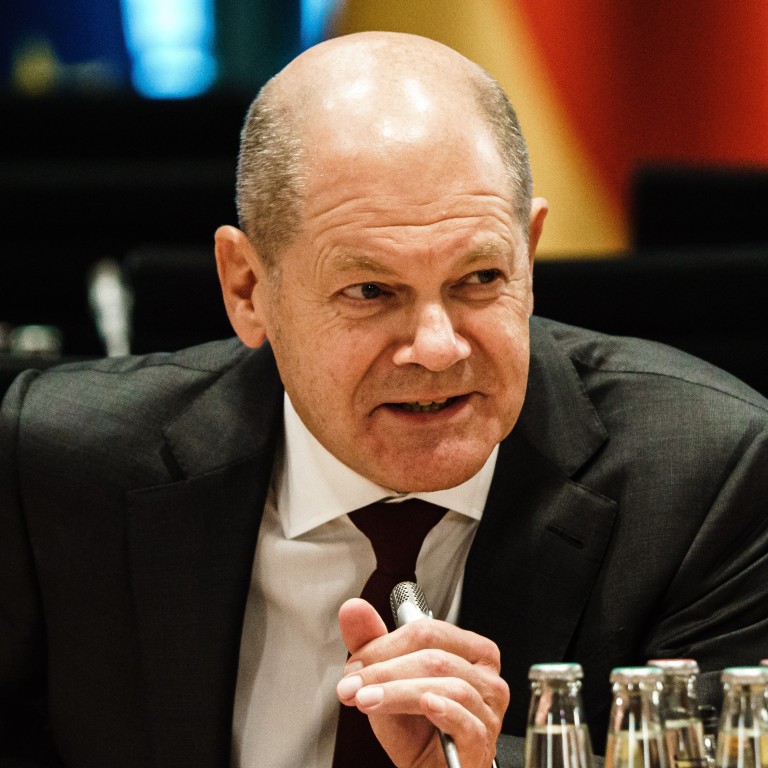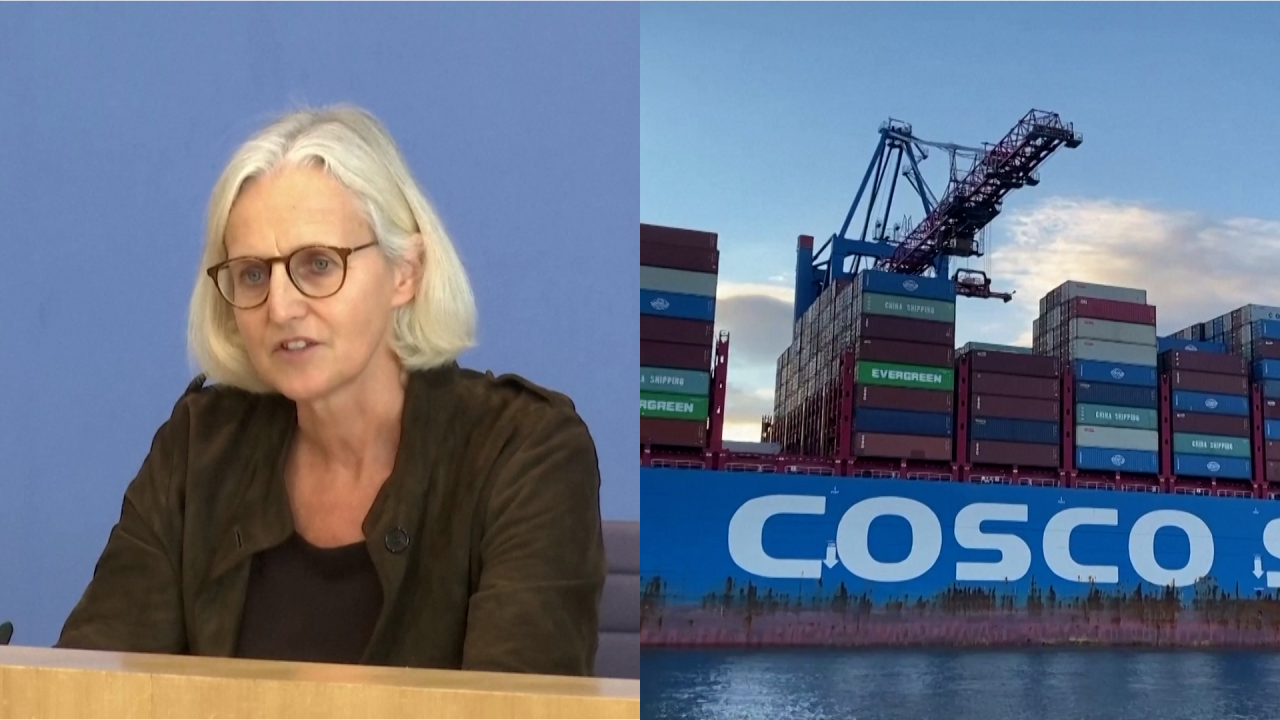
German leader Olaf Scholz under scrutiny as he leads business delegation to China
- Chancellor under pressure to take tougher line, while European allies fear trip will undermine efforts to talk to Beijing in ‘single voice’
- Germany is, by far Europe’s biggest trader and investor with China
From Helmut Schmidt’s 1975 audience with a visibly ailing Mao Zedong, to Angela Merkel’s dozen trips between 2006 and 2019, each of the visiting leaders have tried to pry open the Chinese market to German industry.
But none of the visits have generated as ferocious a storm as Scholz’s.
Scholz is under extreme pressure from coalition partners who are pushing for a tougher stance on China, European allies who are concerned that the trip is undermining efforts to talk to China in a “single voice”, and the United States, which has been advocating a “single theatre” approach to dealing with Russia and China.
But with the euro zone teetering on the brink of recession, and inflation riding above 10 per cent, the chancellor is adamant that China should not be treated in the same way as Russia.
Can China’s commitment to opening up heal rift when Xi and Scholz meet?
In an article in the German newspaper Frankfurter Allgemeine Zeitung on Wednesday, Scholz defended his trip, and addressed some of the issues at play.
“China is and remains an important partner,” he wrote, adding that he would raise “difficult topics” including human rights, but that Germany would not “seek decoupling”.
“Meetings such as this weren’t possible for a long time because of the pandemic and Beijing’s strict measures to contain it. Direct conversation is, thus, all the more important now. And it is precisely because ‘business as usual’ is no longer an option in these circumstances that I’m travelling to Beijing,” Scholz wrote.
G7 leaders denounce China over Russia relations, human rights, Taiwan
“Within the business community, there’s an understanding that China is changing as an economic partner. And this is something everybody is aware of. But in the end you need to find some kind of way to operate, to coexist with this country, because the alternative is war or decoupling,” Rudolf said.
Thilo Brodtmann, executive director at the Mechanical Engineering Industry Association (VDMA), a German business lobby group, said the trip was “an opportunity to inform the Chinese side about the priorities of its most important trading partner in Europe”.
“The European mechanical engineering industry finally needs a level playing field in the Chinese market,” Brodtmann said.
But others have questioned the timing.
Scholz will be the first Western European leader to visit Beijing since before the pandemic, and the first to meet Xi since he secured a landmark third term in power last month.
“A visit by the German chancellor will be staged by China as an endorsement of Xi’s government, which is why the trip is controversial within the German coalition and among some European partner countries,” said Mikko Huotari, executive director of the Mercator Institute for China Studies, a German think tank.
In light of the war in Ukraine, Europe’s dependence on Russian energy has been thrust into the spotlight, evolving into a broader debate about reliance on autocrats for key commodities.
Much of that discussion focuses on Germany, which has been accused of dragging its heels on decoupling from Russian gas, and which is by far Europe’s biggest trader and investor with China.
German companies account for 43 per cent of EU investment in China since 2018, according to a study by the Rhodium Group. Calculations based on Chinese customs data show Germany accounted for 39 per cent of all EU exports to China over the first nine months of 2022.
Decoupling from China ‘the wrong answer’: German leader
A recent report by the Federation of German Industries found that “dependence on many mineral raw materials from China, for example, is already greater than for oil and natural gas from Russia”.
Critics say Scholz’s trip, on which he will be accompanied by German business executives, shows that Berlin is repeating the mistakes of the past.
One EU official, speaking on condition of anonymity, compared the trip to some EU states buying up Russian oil after the invasion of Crimea in 2014, despite Brussels’ admonishments to buy less.
“Some countries, instead of reducing their dependence [on Russia], increased it. That is the problem, but it is their decision. For Germany with China, the more they will increase their economic dependence the more exposed they are,” said the official.
The tone of the debate has sharpened in recent weeks after a public spat over Chinese investment in Germany.
Scholz, the former mayor of Hamburg, leaves on the trip barely a week after he pushed through the purchase of a minority stake in a Hamburg Port terminal by a Chinese state-owned shipping behemoth, Cosco, ignoring the advice of six ministries and the European Commission, which opposed the sale on national security grounds.

Commenting on the purchase, Thomas Haldewang, Germany’s domestic intelligence chief, said: “When people talk about China, they say: ‘Russia is the storm, China is climate change.’ We cannot allow a situation where the Chinese state can influence political events in Germany, possibly through critical infrastructure.”
Sven Biscop, an expert in European foreign and security policy at the Egmont Institute, a Brussels-based think tank, supports engagement with China and rejects the idea of decoupling. He sees no issue with Scholz bringing a business delegation to China, but despairs at the timing.
“I would argue that after the Communist Party congress, it’s not up to the EU to rush to visit China, but it should be the other way. The onus should be on the Chinese to tell us their new policy lines and demonstrate that they want a constructive relationship,” Biscop said.
He also believes that the Hamburg Port deal raises question marks about Scholz’s decision to travel.
“You can only continue to have this deep economic relationship with China if you build in safeguards, and the Hamburg deal is going exactly the opposite way – it is reducing the safeguards. Not doing stuff like Hamburg is actually a precondition for continuing the relationship with China,” Biscop said.
China competition swamps all other EU relations with Beijing, top diplomat says
The events have placed new strain on a three-way coalition that has already been wobbling.
“Frustration within the Greens at Scholz’s approach on Ukraine and energy policy has been building for months. His actions on China over the past weeks, particularly the decision to ram through the Cosco deal, have brought resentment to the boiling point,” said Noah Barkin, an expert in EU-China relations at the Rhodium Group.
“I don’t expect the Greens to blow this coalition up at a time when a war is raging in Europe and Germany faces forceful economic headwinds. But Scholz’s actions will leave deep scars.”
With critical eyes watching every development, Scholz will be under pressure to get something from Xi during their meeting, Rudolf said.
“It’s a bold political move to some extent; it is a gesture to Xi Jinping at a time when you shouldn’t be doing that, right after the 20th party congress. So the question is whether Xi and the Chinese will interpret it like this and give him something in return to keep the domestic audience happy,” he said.
For Rudolf, lifting Chinese sanctions on EU lawmakers and academics, or allowing German vaccine maker BioNTech access to the Chinese market, in turn sending a strong signal to European businesses, would represent successful achievements.
Gu Xuewu, chair in international relations at the University of Bonn, said the trip was sensible given the economic relationship, but also “risky”, given the timing just after the Communist Party congress.
Gu hoped Beijing was “clever enough to recognise the chancellor’s dilemma”, and offer him some deliverables that would assuage the critics at home.
“They should give him some ‘face’ to return home by accepting his invitation to join the ‘Climate Club’ created by Scholz as chairman of the G7, and by pledging to do more to influence to end the Ukraine war as soon as possible,” he said.


